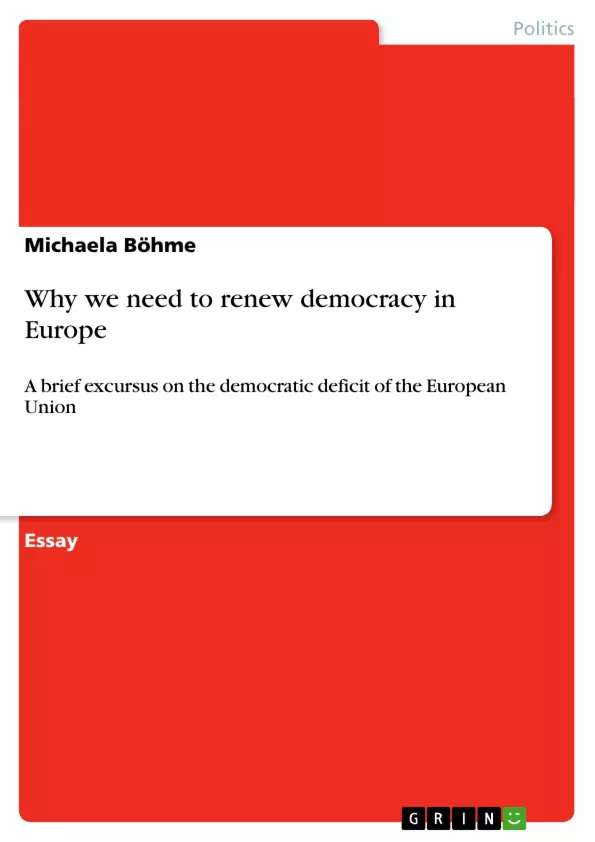Certainly, at least in Europe and the United States, democracy is taken for granted. Not only is our political system democratic, our entire society is democratically organized. Our current understanding of democracy came about as a result of the emergence of the European nation-state. The functioning of modern democracy is consistent with the political system of the state. In the twentieth century the transforming processes of globalization, including the empowering of global institutions as well as technological revolution, influenced the role and functioning of the modern nation state. A new complexity and greater number of actors appeared on the world stage and the term ‘government’ was increasingly regarded as inappropriate in capturing political reality. The differentiated governance approach is more likely to be capable of dealing with complexity. But what are the effects on democracy?
This term paper argues that change from ‘government’ to ‘governance’ forces a change in the concept of democracy as well. To prove this assumption the European Union is closely examined.
Inhaltsverzeichnis (Table of Contents)
- Introduction
- 1. Theoretical Background
- 1.1 The Concept of Democracy
- 1.2 The Changing Nation-State
- 1.3 The New Governance
- 2. Democracy and the European Union
- 2.1 The Multi-level System of the EU
- 2.2 Applying Democracy to the EU
- 2.3 The Democratic Deficit in the European Union
- 2.4 A Question of Standard Setting?
- 2.5 Potential Remedies
- 3. Conclusion
Zielsetzung und Themenschwerpunkte (Objectives and Key Themes)
This term paper argues that the transition from 'government' to 'governance' necessitates a corresponding shift in the concept of democracy. To demonstrate this, the European Union is scrutinized in detail. The paper analyzes the democratic deficit of the European Union, highlighting the challenges in reconciling the demands of democracy with the complex, multi-level governance structure of the EU. The paper also explores the potential remedies for addressing this deficit.- The evolution of democracy and its relationship with the nation-state.
- The challenges of applying the concept of democracy to the multi-level governance structure of the European Union.
- The concept of the democratic deficit within the EU and its implications.
- The debate over standard setting and the potential remedies for addressing the democratic deficit.
Zusammenfassung der Kapitel (Chapter Summaries)
The introduction sets the stage by highlighting the widespread acceptance of democracy in Europe and the United States, tracing its origins to the emergence of the nation-state. It introduces the concept of governance and its implications for democracy. Chapter 1 delves into the theoretical background. It traces the evolution of the concept of democracy from its origins in ancient Greece to its modern manifestation. The chapter examines the historical development of the nation-state and its impact on the concept of democracy. It further explores the changing role of the nation-state in the context of globalization and the rise of global institutions. Chapter 2 focuses on the relationship between democracy and the European Union. It examines the multi-level governance system of the EU and the challenges of applying democratic principles within this framework. The chapter analyzes the concept of the democratic deficit in the EU, exploring the debate over standard setting and potential remedies.Schlüsselwörter (Keywords)
The main focus of this paper is the relationship between democracy and governance in the context of the European Union. It examines the concept of the democratic deficit, the challenges of applying democratic principles to a multi-level governance structure, and potential solutions to address these challenges. Key concepts explored include: democracy, European Union, globalization, governance, government, political system.Frequently Asked Questions
What is the difference between 'government' and 'governance'?
'Government' refers to the traditional, state-centered political authority, while 'governance' involves a more complex, multi-level system with a greater variety of actors.
What is the 'democratic deficit' in the European Union?
It refers to the perceived lack of democratic accountability and public participation in the decision-making processes of the EU compared to national governments.
How has globalization influenced the role of the nation-state?
Globalization has empowered global institutions and technological changes, forcing nation-states to adapt their political systems to a more interconnected reality.
Why does the paper argue for a renewal of democracy in Europe?
Because the shift to governance structures makes traditional democratic models less effective, requiring new ways to ensure legitimacy and participation.
What are potential remedies for the EU's democratic deficit?
The paper explores various strategies, including standard setting, increased transparency, and strengthening the role of the European Parliament.
- Citar trabajo
- Michaela Böhme (Autor), 2010, Why we need to renew democracy in Europe, Múnich, GRIN Verlag, https://www.grin.com/document/210359



